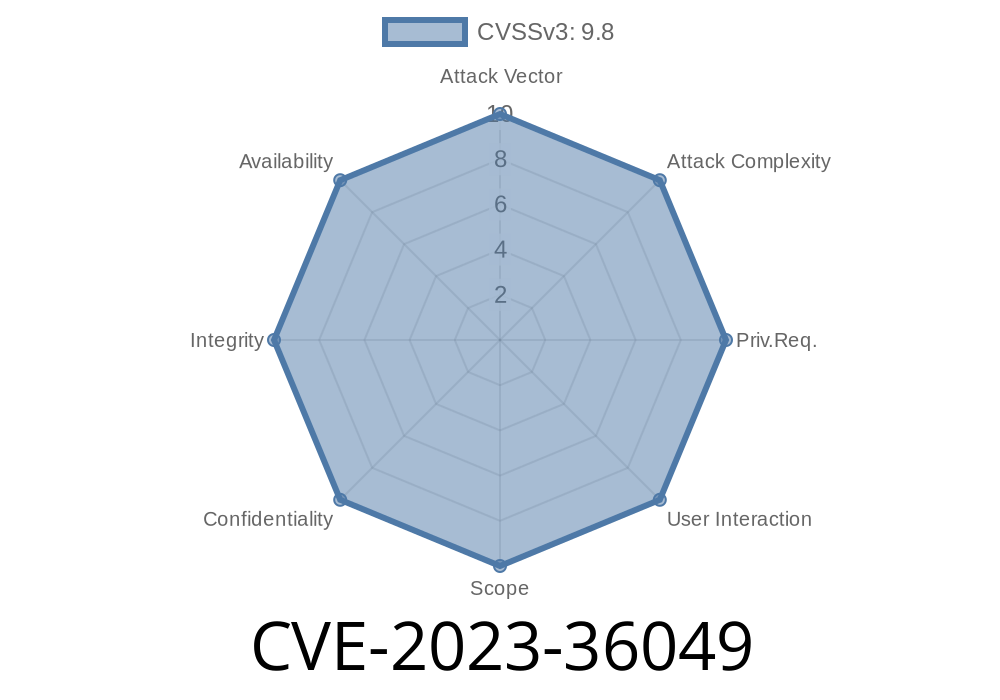The world of .NET development is often praised for its security features and powerful tools. But no software is flawless. In late 2023, a serious vulnerability surfaced: CVE-2023-36049, affecting .NET, .NET Framework, and Visual Studio. This flaw can allow attackers to escalate their privileges, potentially taking partial or complete control over affected systems. In this post, we’ll break down what happened, why it matters, how you can exploit (and defend against) it, and provide links and code samples for deeper understanding.
What Is CVE-2023-36049?
CVE-2023-36049 is an Elevation of Privilege vulnerability. In simple words, it allows a user with low-level permissions to gain higher-level, often administrative, access to a system. For developers and system admins using .NET or Visual Studio, this can be a significant risk—bad actors could potentially alter applications, read sensitive data, or compromise servers.
How Does the Vulnerability Work?
According to the official Microsoft advisory, the problem lies in how certain code runs in the context of the current user. Under specific conditions, an attacker can leverage a flaw in process isolation when certain APIs are used. The attack hinges on exploiting the way process creation and resource access are handled.
Technical Deep Dive
When a process is spawned from a .NET or Visual Studio environment, security tokens and permissions should be tightly managed. However, a bug in the System.Diagnostics.Process API—if not correctly mitigated—can allow user input to influence which binary is executed and with what privileges.
Example Vulnerable Code (C#)
using System.Diagnostics;
public void RunExternalTool(string exePath)
{
ProcessStartInfo psi = new ProcessStartInfo();
psi.FileName = exePath;
psi.UseShellExecute = false;
// Potentially dangerous: exePath is user-controlled
Process process = Process.Start(psi);
}
If an attacker can somehow control exePath, they could point it to a malicious binary. In affected versions of .NET/Visual Studio, this might execute with elevated rights, depending on the parent process’s privileges.
An attacker can exploit this by
1. Supplying Path Injection: By controlling the argument to Process.Start(), they can redirect execution to a malicious binary on disk.
2. Gaining Elevated Rights: If the parent process runs under increased privileges (e.g., as Administrator or a build service), the attacker's code inherits those privileges.
Place a Malicious Executable
The attacker uploads a malicious file named, say, cmd.exe to a directory that is likely to be referenced.
Trigger the Vulnerable Code
The attacker finds a vector (such as a plugin, build script, or misconfigured tool) capable of calling the vulnerable method and directs it to launch their binary.
Let's say a misconfigured build step in Visual Studio allows a user-supplied parameter
public void BuildProject(string buildTool)
{
ProcessStartInfo psi = new ProcessStartInfo();
psi.FileName = buildTool; // not validated!
psi.Arguments = "...";
Process.Start(psi);
}
If buildTool comes from user input or an environment variable, an attacker can specify a path to their payload, which could then run as a privileged process.
Microsoft has released fixes for all supported versions in these updates
- .NET Framework: Security Update
- .NET 6/7: Update packages available via NuGet and Microsoft
- Visual Studio: Patch through the Visual Studio Installer
Always validate and sanitize input: Never pass user input directly to sensitive methods.
- Use secure APIs: Favor secure overloads and avoid UseShellExecute=true unless absolutely necessary.
- Least-privilege principle: Design applications so that spawned processes run with the minimum required permissions.
- Code Audits: Review your codebase for any instances of user input influencing system/process-level operations.
Key References
- Microsoft Security Response Center: CVE-2023-36049
- NVD National Vulnerability Database: CVE-2023-36049
- .NET Security Best Practices
Conclusion
CVE-2023-36049 is a reminder: even the most trusted frameworks can have critical vulnerabilities. If you’re running server software, build services, or apps in Visual Studio/.NET, patch now. Always scrutinize your code, especially where untrusted input can influence your system.
Stay safe, patch often, and never trust user input!
If you want to learn more or share your experience with CVE-2023-36049, comment below!
Timeline
Published on: 11/14/2023 21:15:10 UTC
Last modified on: 11/21/2023 19:25:39 UTC
